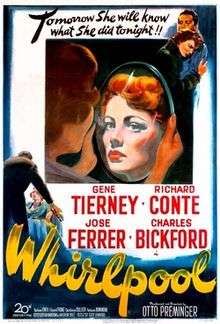Whirlpool (1949 film)
| Whirlpool | |
|---|---|
 Theatrical release poster | |
| Directed by | Otto Preminger |
| Produced by | Otto Preminger |
| Screenplay by |
Ben Hecht Andrew Solt |
| Based on |
Methinks the Lady 1946 novel by Guy Endore |
| Starring |
Gene Tierney Richard Conte José Ferrer Charles Bickford |
| Music by | David Raksin |
| Cinematography | Arthur C. Miller |
| Edited by | Louis R. Loeffler |
| Distributed by | 20th Century Fox |
Release date |
|
Running time | 98 minutes |
| Country | United States |
| Language | English |
Whirlpool is a 1950[1][2] film noir thriller directed by Otto Preminger and written by Ben Hecht and Andrew Solt, adapted from Guy Endore's novel Methinks the Lady. The film stars Gene Tierney, Richard Conte, José Ferrer and Charles Bickford, and features Constance Collier in her final film role.[3] Due to anti-British statements Hecht had recently made regarding their involvement in Israel, UK prints of the film replaced his credit with a pseudonym, Lester Barstow.
The drama combines crime drama with psychological thriller (the heroine is controlled by a murderous hypnotist) and melodrama, as the central character's marriage is threatened.
Four years later, Conte starred in The Blue Gardenia, which has a strikingly similar plot, but replaces the psychoanalysis angle with a more straightforward procedural storyline.
Plot
Ann Sutton (Gene Tierney), the wife of a successful psychoanalyst (Richard Conte), is arrested for shoplifting. Ann is saved from scandal by smooth-talking hypnotist David Korvo (José Ferrer).
Korvo is not what he seems to be, and Ann soon finds herself involved in blackmail and murder. She is unsure whether or not she committed a crime. Her distant but loyal husband stands up for her and eventually sets up the hypnotist, whom he believes is behind all the misdeeds.
Cast
- Gene Tierney as Ann Sutton
- Richard Conte as Dr. William Sutton
- José Ferrer as David Korvo
- Charles Bickford as Lt. Colton
- Barbara O'Neil as Theresa Randolph
- Eduard Franz as Martin Avery
- Constance Collier as Tina Cosgrove
- Fortunio Bonanova as Feruccio di Ravallo
Reception
Critical response
The staff at Variety magazine liked the film and wrote, "Whirlpool is a highly entertaining, exciting melodrama that combines the authentic features of hypnosis. Ben Hecht and Andrew Solt have tightly woven a screenplay [from a novel by Guy Endore] about the effects of hypnosis on the subconscious, but they, and Otto Preminger in his direction, have eliminated the phoney characteristics that might easily have allowed the picture to slither into becoming just another eerie melodrama."[4]
While The New York Times' film critic Bosley Crowther gave the film a mixed review, he still appreciated the acting, and wrote, "Yet, as we say, this flapdoodle, written by Ben Hecht and Andrew Solt from a novel by Guy Endore, has been handsomely produced and played by a cast which is distinguished by José Ferrer in its midst. Mr. Ferrer, the Broadway champion, is the smooth and piercing villain of the piece who mouths Mr. Hecht's silken phrases with acid savor and burns folks with his eyes. Furthermore, haughty Gene Tierney plays the lady who is slightly off the track and Charles Bickford and Richard Conte are the detective and the husband, respectively. All together, along with several others, they labor to cast a spell. But their efforts are bleakly artificial. You'd better see this one in a state of trance."[5]
The UK's Channel 4 also gave the film a mixed review, but lauded the screenplay and direction. They wrote, "All this is fairly ridiculous and the plot is full of implausible twists, not to mention daft theories. Luckily, Tierney carries the role of the innocent beauty with ease and has a particularly good line in gliding around blank-faced as if under hypnosis – and in showing her character's subsequent distraught confusion. Conte is stiff and wooden – but no more so than his formal man-of-science role requires, while Ferrer is a compelling cartoon villain. Hecht's dialogue is as snappy as ever, and Preminger cranks up the tension with consummate skill, building towards a dramatic and satisfying conclusion."[6]
See also
References
- ↑ Showmen's Trade Review, Dec 31, 1949
- ↑ Motion Picture Daily, Jan 5, 1950
- ↑ Whirlpool on IMDb.
- ↑ Variety. Film review, 1949. Last accessed: February 6, 2008.
- ↑ Crowther, Bosley. The New York Times, film review, January 14, 1950. Last accessed: February 6, 2008.
- ↑ Channel 4. Film review, 2008. Last accessed: February 6, 2008.
External links
- Whirlpool on IMDb
- Whirlpool at AllMovie
- Whirlpool at the TCM Movie Database
- Whirlpool at the American Film Institute Catalog
- Whirlpool film trailer at YouTube